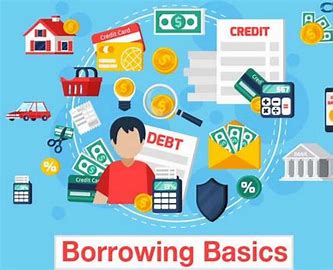- Ways to Borrow Money and What It Costs – What Borrowing Means When you borrow, a lender provides you money, and you must pay it back—usually with interest.
Credit = The Ability to Borrow Money
Debt = Money You Owe a Person or Business
2. Types of Loans – An installment loan is typically repaid in equal payments for a specific period, usually several years. A buy now, pay later loan is a type of installment loan made at the time of purchase. A revolving loan allows unlimited purchases up to a preapproved dollar limit. Payments vary based on how much you borrowed.
3. Secured and Unsecured Loans – Secured loans require collateral. You pledge collateral to support repayment of the loan. Collateral is an asset you own, such as your house, vehicle, or cash. If you cannot repay the loan as agreed, the lender can take your collateral and use it to get some or all of their money back. Unsecured loans are based only on your promise to repay the money you borrow. They do not use collateral.
4. The Cost of Borrowing – The amount you repay on a loan is generally greater than the amount you borrow. Principal – Amount of money you borrow. Interest – Amount of money a financial institution charges for allowing you to use its money—expressed as a percentage. Fees – May be charged by financial institutions for certain activities, such as reviewing your loan application or servicing the account. Prepayment – Early repayment of all or part of a loan—when you shop around for a loan, find out if a fee could be charged for prepayment (called a prepayment penalty).
5. Be sure you can afford the payments before getting a loan. Also, know how much it costs and what happens if you cannot pay it back.
6. Preparing to Apply for a Loan – Factors Lenders May Use in Their Decisions – Each lender has its own method for determining whether you are a good credit risk.
- Your credit history: How you have paid your bills or debts.
- Your capacity: Your present and future ability to meet your payments.
- Your capital: The value of your assets and your net worth. Net Worth = Your Assets – Your Liabilities
- Your collateral (for secured loans only): The assets that secure the loan.
- Conditions: Other factors that affect getting the loan
7. Co-Borrowing and Co-Signing – Co-borrowing is taking out a loan jointly with one or more people. ¡ Each co-borrower is responsible for repaying the debt. Payment history appears on the credit reports of each co-borrower. ¡ Before you co-borrow, have a clear agreement with the other co-borrowers about how much of the loan payment each will pay and other responsibilities. Co-signing is taking full responsibility for paying back a loan, along with the primary borrower. The loan proceeds go to the borrower and not to the co-signer. When you co-sign, you promise to pay the debt if the borrower does not.
8. Borrowing When Someone Helps You Manage Your Money – Responsibilities of the Person Helping You – When someone helps you with your finances, they must:
- Act in your best interest.
- Manage your money and property carefully.
- Keep your money and property separate from theirs.
- Keep good records.
- Include you in decision-making to the extent possible.
9. What to Discuss – You may want to discuss these questions with the person who helps you with your finances and a trusted advisor. It is okay if the people helping you with your money also help you answer these questions.
You do not need to know all the answers yourself.
Why do you want or need to borrow money?
- Do you have enough money to repay the loan?
- How will you make payments on the loan?
- How will you monitor the loan?
- Will borrowing money affect any of your sources of income?
10. If You Decide to Borrow Money – Understand the loan terms before you commit to it. You should know:
- How much money you are borrowing?
- How much money you have to pay back in total.
- How much money you must pay each month.
- When payments are due.
Get help considering the loans terms and completing the application. A lender cannot disqualify you because you need help. The lender decides if you are a good credit risk, just as they would any other potential borrower. The lender does not consider the creditworthiness of the person helping you unless that person is a co-signer or co-borrower.
11. After you borrow money, you need to:
- Repay the loan.
- Always make payments on time.
- Keep good records.
- Even if someone helps you manage your money, understand the loan terms before you commit to it.
Source: Money Smart for Young Adults
